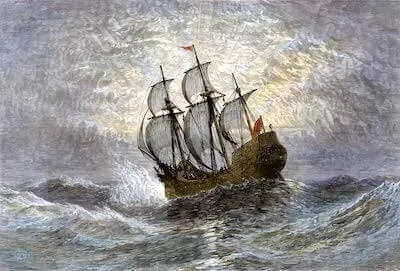One’s native land, or the native land of one’s ancestors.
Mother country
What's the meaning of the phrase 'Mother country'?
What's the origin of the phrase 'Mother country'?
The most common use of this expression in English derives from the early European settlers to the USA. Two prominent figures of the Pilgrim Father settlers were John Robinson and William Brewster. While in Holland, and planning the emigration to America on the Mayflower, they wrote to Sir Edwyn Sandys in 1617:
“We are well weaned from ye delicate milke of our mother countrie, and enured to ye difficulties of a strange and hard land, which yet in a great parte we have by patience overcome.”
In his style of naming his children, Brewster followed, and given the early date we might better say pioneered, the Pilgrim tradition of choosing names in accordance with biblical themes. His first child was called Jonathan, but he soon got into his stride with Patience, Fear, Love and finally, Wrestling.
The ‘mother country’ to Brewster and Robinson was, of course, England and that was generally what was meant when the phrase came into use in the USA. They didn’t coin the phrase themselves but probably read it in the works of a prominent Puritan of the day – Arthur Golding. Brewster in particular was well read and owned a library of some 400 books in Latin and English and was sure to have read Golding’s works. ‘Mother country’ appears in more than one of Golding’s works. For example, The eyght bookes of Caius Iulius Caesar, 1565:
So their mother countrye in Europe not onelye troubled their neighbours, but also vexed and disquietted euen the victorious Romanes
The expression is also found in Golding’s well-known translation of Ovid’s Metamorphosis, 1567:
They went too Phebus Oracle, which willed them too go Untoo theyr moother countrey and the coastes theyr stocke came fro.
It is perhaps an indication of the way of thinking of the Pilgrim Fathers that they chose to adopt the term ‘mother country’, as opposed to ‘fatherland’, which was used by others in the 17th century to denote the country of one’s heritage.
The phrase was coined before America was settled by English speakers and popularised by two Englishmen living at the time in Holland. Nevertheless, ‘mother country’ can be said to be the first English phrase to have a strong American association – some might say, the first American phrase.
[My thanks to Peter Lukacs, ElizabethanDrama.org for the 1565 citation.]
See other phrases that were coined in the USA.
The history of “Mother country” in printed materials
Trend of mother country in printed material over time
Related phrases and meanings
Browse more Phrases
About the Author

Phrases & Meanings
A-Z
A B C D E F G H I J K L M N O P Q R S T UV W XYZ
Categories
American Animals Australian Bible Body Colour Conflict Death Devil Dogs Emotions Euphemism Family Fashion Food French Horses ‘Jack’ Luck Money Military Music Names Nature Nautical Numbers Politics Religion Shakespeare Stupidity Entertainment Weather Women Work
How did we do?
Have you spotted something that needs updated on this page? We review all feedback we receive to ensure that we provide the most accurate and up to date information on phrases.
